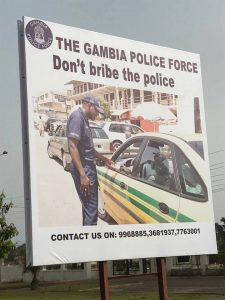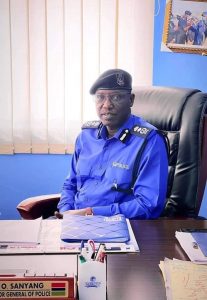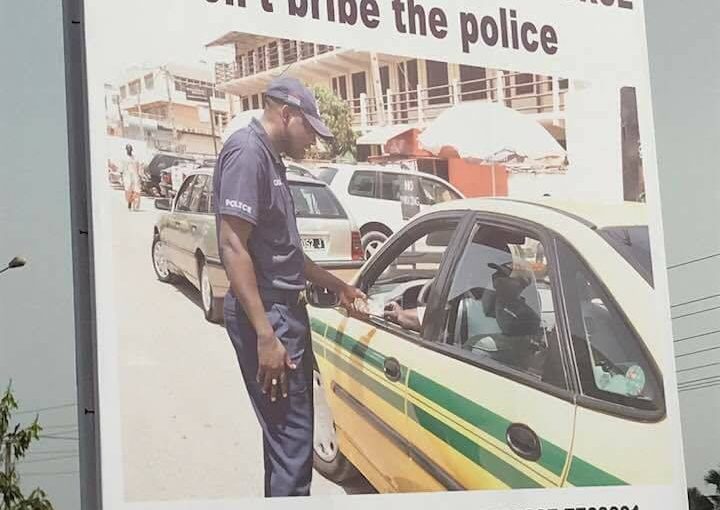 Alagi Yorro Jallow.
Alagi Yorro Jallow.Fatoumatta: Pope Francis reminded us that corruption is like cancer; it spreads and corrupts the whole body, bringing decay and death. About “Do not Bribe the Police,” the Inspector General of Police’s effort to address the issue of police bribery and corruption by introducing the baseline campaign of anti-corruption police policy must be applauded by all Gambians.
To do so, the public is encouraged to discuss this issue of civilian and police and racketeering of bribery corruption openly, and more importantly, to have a perspective on the measures and activities that the public institutions are taking to prevent and suppress the cankerworm of the sin of corruption.

Fatoumatta: Police corruption is the most harmful type of corruption, whether it is a ground point corruption that comes from within the police or a stepping stone involved in the chain of political, judicial, or another type of corruption. Corruption in the Ministry of Interior and the Police organization represents each action or negligence committed by an official while performing on duty, for which he or she demands or receives a particular benefit for himself or other persons, as well as any different kind of violation of standard procedures, abuse of official power or misconduct while using authority.
However, a pathetic indicator of how low the country has sunk. President Adama Barrow’s silence on this critical national matter is also disconcerting. We commend the Inspector-General of Police with that giant billboard in public places educating Gambians not to bribe police officers.
Fatoumatta: Fighting bribery and corruption must begin at State House, but that should not excuse each of us from playing our part in curbing the vice. The IGP, once introducing a campaign on corruption emblazoned on a giant billboard on the streets of Greater Banjul, constructs some mechanisms for implementation of a national anti-corruption policy in the Gambia. This is a primary need to acknowledge the very presence of corruption in the police force.
It a simple and profound message to fellow Gambian citizens: “Do not Bribe the Police.”
For decades Gambians have been waiting for the National Assembly, the Judiciary, police, and the various anti-corruption bodies to slay the demon of corruption. Each of them has failed and only added to the cynicism and despair about finding a solution.
A few years ago, I used the public facilities at the Banjul International Airport as I waited for a delayed international flight. The toilets were immaculate, but as I washed my hands, the attendant and an airport police officer in uniform approached and suggested that I give them few Dalasis to buy dinner. They took me for a generous foreigner in what appeared a well-rehearsed and good begging routine.
I was enraged by the police officer and the lady’s brazenness, and my outburst had them at first sweating and later weeping as they pleaded with me not to report them or publish the story in my newspaper.
Furthermore, I had a similar experience with another patrol police officers when they were disappointed to discover that our official driver of the Independent, Ansu Jammeh, had both essential First Aid items and a car fire extinguisher in our Suzuki Jeep. They asked for all particulars of the vehicles, which were all intact. Finally, they asked for lunch. This is clear evidence of police corruption measurement and lack of police integrity in the Gambia Police Force.
Fatoumatta: Corruption has become so routine. Every day in public office, we remember the courteous or honest person because they are the exception. Pa Lamin Njie, a taxi driver, narrated an extensive list of police charges for unrecognizable offenses, which he duly pays without complaint. He expressed utter disbelief when I told him that I had never spent a bribe in 27-something years.
My advice for Gambians is also quite blunt: the day you pay a bribe in the Gambia, you should leave the country as you only add to the rot. There is something grotesque about being asked for a fix. You feel violated and objectified. We have the solution within each one of us. Our integrity, values, and courage are the weapons for the struggle of successful core leadership and ethical integrity. We should not underestimate our ability to confront powers, systems, and cartels. We are the ones we have been waiting for. If we fail to take our responsibility seriously, remember that we are, in turn, corrupting our children, the flesh of our flesh.
Fatoumatta: Take a step today where you live to confront the untouchables, the policeman, the court clerk, tax officer, the hospital official, or everyone else who wants you to believe that service is a privilege, not a right.
Congratulation IGP.

